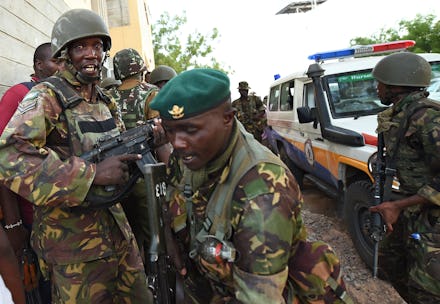We're Going to Forget About the 148 People Killed in Kenya Last Week

We're going to forget about Garissa. In fact, we've already begun.
It doesn't matter that the city of 110,000 saw Kenya's most lethal terrorist attack of the past 17 years last Thursday. Kenya is in Africa, and Africa is where this sort of thing just happens.
We're going to forget about Garissa because we always forget about places like Garissa: remote, foreign, usually populated with brown or black people. The news cameras stay just long enough to capture the carnage, but as viewers' attention wavers, the cameras get packed up soon after. The news trucks leave and we know as little about the place they were covering as when they arrived. And they rarely come back — unless there's another massacre, of course.
On Monday, Kenyans took to Twitter to remind the world that "147" isn't just the number of bodies that were strewn about Garissa University campus after four members of Somalia-based terror group al-Shabab attacked the grounds with machine guns last week. (Early reports had the tally at 147, but now 148 people are reported dead.) It's also the number of lives and devastated families those bodies left behind. And we need to remember their humanity.
Columbia University journalism professor Howard W. French explained as much in an open letter to the producers of 60 Minutes in March, when he wrote that the program's coverage of Africa was marked by "frequent and recurring misrepresentation" that "[renders] people of black African ancestry voiceless and all but invisible."
60 Minutes is not alone in this respect. Critics have long decried the Western media's portrayal of the continent as monolithic and marked by undue emphasis on violence and disease. "Africa only warrants the public's attention when there is disaster or human tragedy on an immense scale," French added.
Such ignorance extends to notions of geography, too: CNN reported some of its Garissa coverage from the nonexistent city of "Nairobi, Nigeria."
This coverage suggests an overarching inability of Westerners to accurately conceptualize Africa or humanize Africans, instead viewing them through the lens of stereotypes like "the victim," "the noble savage" or "the grateful child."
At the end of the day, we're going to forget about Garissa because there's no pressure to remember it. Major news outlets won't stay long enough to make us watch what happens next, or contextualize what came beforehand. Not to mention our apathy tends to betray us anyway, as Al Jazeera saw when covering the beginning of the Syrian civil war's fifth year and found, putting it bluntly, that "few cared."
Whether the West cares or not, Kenyans are mourning Garissa's dead. They did the same for Nairobi's dead after al-Shabab's 2013 gun attack on the Westgate shopping mall that left 67 dead. But as of yet, the world has not joined them. There's no massive global outpouring of public support, no summit of world leaders converging on Garissa — or anywhere even close, for that matter — and marching through the streets in mourning, as they did in France after January's terror attack on the Paris headquarters of Charlie Hebdo, a satirical magazine.
Simply put, there's little being done in the West to mark this tragedy as abnormal — we only see Kenya in the news when serious tragedies strike, so it gives us the impression that it's the only thing that happens there.
As such, we seem destined to forget it, to blunt its impact under the fog of normalization. The people of Garissa deserve better. And as long as the Western media continues only paying attention to African countries when tragedy strikes them, forgetting that other things happen there will be our fate.